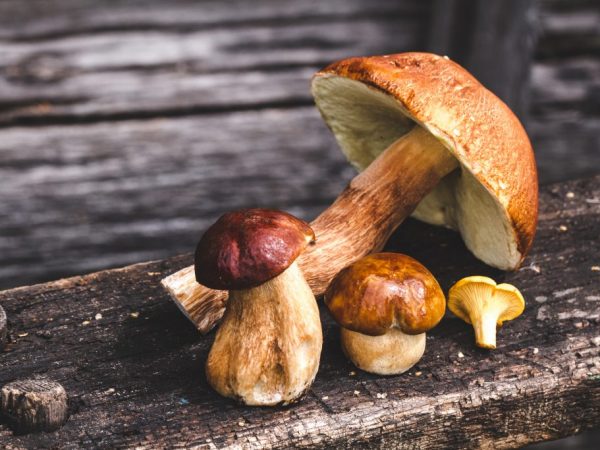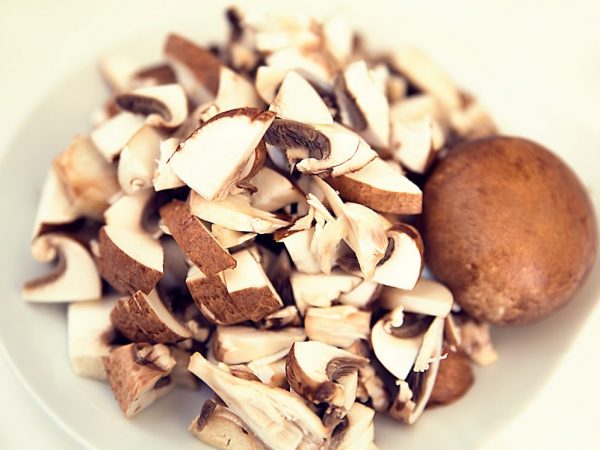Mushrooms while breastfeeding
For women who are breastfeeding, there is a list of foods that they should not eat because they are harmful to the baby. In this article, we will consider whether it is possible to eat mushrooms for mommy while breastfeeding.

Mushrooms while breastfeeding
Properties of mushrooms
Mushrooms are among the healthy foods, because they contain many different vitamins, macro- and microelements. However, they take a long time to digest, and also provoke allergic reactions. Dishes made from them can cause poisoning if the mushrooms were of poor quality.
Benefit
- thanks to the components that make up their composition, they cause a feeling of fullness at a much lower volume than other products, i.e. they are hearty;
- have a beneficial effect on the immune system and muscle tissue;
- strengthen nails and teeth, saturate the skin with vitamins;
- maintain energy balance in the body;
- improve vision;
- help to fall asleep easily and promote healthy sleep;
- improve the functioning of the nervous system and blood quality;
- rid the body of "bad" cholesterol;
- have a regenerating and anti-inflammatory effect;
- prevent mild colds and infectious diseases;
- reduce the likelihood of cancer cells and cardiovascular disease.
Chanterelle mushrooms are used for the prevention and treatment of lung diseases.
Harm
To find out exactly whether it is dangerous to eat mushrooms for a nursing mother or not, you should contact your doctor or pediatrician. Indeed, in this matter there are many nuances regarding the types of mushrooms, the dose of their use, the diet, etc.
Sometimes a woman may not even suspect that she is allergic to this product, because there have been cases when allergic reactions manifested themselves only after the birth of a child.
For a newborn and a nursing mother, mushrooms can pose a serious danger due to the high content of toxins. Fruiting bodies easily absorb toxic chemical compounds found in the soil, which, even after thorough and prolonged cleaning or processing of products, still enter the body of the mother and baby.
Due to the large amount of toxins, poisoning occurs, and sometimes fungal spores penetrate the lungs, which provokes an allergic response.
Also, this product strongly loads the urinary organs and the digestive system. Due to the content of heavy elements (fiber and carbohydrates), mushrooms are broken down and absorbed by the body for a long time, especially for children.
In babies 3-4 months of life, the digestive system is not yet fully formed, therefore, certain foods can cause colic, changes in the consistency and color of stools, and an increase in the level of gas formation.
Rules for the use of mushrooms

A nursing mother can eat mushrooms in small quantities
Often, a woman during lactation experiences a sharp, irresistible desire to eat a mushroom dish. In such cases, it is possible to eat small quantities of mushrooms.
You can start eating mushrooms while breastfeeding only 4-6 months after childbirth.
For the first time, it is better to try them boiled (no more than 5 pieces). See how your child's body reacts. If symptoms of allergies, gastrointestinal disturbances or other signs appear, then immediately show the child to the pediatrician. If there is no negative reaction, it means that the periodic use of mushrooms for a nursing mother is not contraindicated.
The daily rate is 50-60 g of the finished product.
What mushrooms can you eat and how often
For a nursing mother, mushrooms are allowed to be eaten once every 2 weeks in the first year of breastfeeding, and in the second year - once a week.
When breastfeeding, mushrooms and oyster mushrooms practically do not cause any danger. Compared to other species, champignons (white, brown, dark) almost do not absorb toxic substances from the soil and have many useful properties:
- free the body from harmful substances;
- contribute to the normalization of lactation and metabolism in the female body due to the high fluid content in its composition;
- prevent constipation and normalize stool;
- easy to digest due to the absence of heavy elements;
- are low in calories;
- energize the body;
- are meat substitutes due to their high protein content;
- do not cause intoxication, poisoning and obesity;
- allowed for use by patients with diabetes mellitus due to the absence of sugars in their composition.
When breastfeeding, oyster mushrooms will also be beneficial because they are low in calories and can easily replace meat products. They improve the quality of blood, rid the body of cholesterol and other harmful substances, and prevent the appearance of infectious diseases. Like champignons, oyster mushrooms are not toxic, but they often cause allergic reactions.
You should not eat mushrooms for problems with the stomach and intestines, with kidney failure, with diseases of the digestive system and liver, as well as with frequent accumulation of gas in the intestines (flatulence).
What mushrooms should be eaten carefully
In the first six months of breastfeeding, doctors do not recommend eating chanterelles, porcini mushrooms of any kind, milk mushrooms and boletus. These forest mushrooms absorb heavy metals and therefore take a long time to digest.
When the GW period is over, feel free to eat all the mushrooms. The porcini mushroom improves the functioning of the digestive and immune systems, helps to restore strength and gives the body energy. Chanterelles also have a number of positive qualities: they help to normalize sleep, increase visual acuity, and strengthen muscles. They are used to prevent colds.
Recommendations
Salted, fried, canned and pickled mushrooms are prohibited while breastfeeding.
Irina Selyutina (Biologist):
For a nursing mommy who loves mushrooms, you need to remember:
- At this point in time (lactation period), you will have to limit yourself exclusively to "cultivated" oyster mushrooms and mushrooms, which are grown in special nurseries. And remove wild relatives from the diet, despite their more pronounced taste.
- Under no circumstances should you purchase these mushrooms in spontaneous markets (you do not know where they were grown).
These products are bad for the lactation process and can impair the functioning of the digestive tract. Doctors also forbid eating mushrooms raw - they can provoke poisoning or disease of the stomach and intestines.
Mushrooms with HS are desirable to bake, stew or cook with vegetables. However, mushroom broth without fruit bodies is recommended to be eaten only after 6 months of lactation, and soup with their pieces - only after one year. It is also forbidden for nursing mothers to eat products that were grown near roads or factories.
Conclusion
Women often bring up the topic: is it okay for a nursing mother to have mushrooms or not.This question is very controversial, because everything depends on the characteristics of the female and child's body, as well as on the mother's diet, types of forest products and methods of their preparation. To avoid any problems, it is better to discuss such issues with your doctor.



